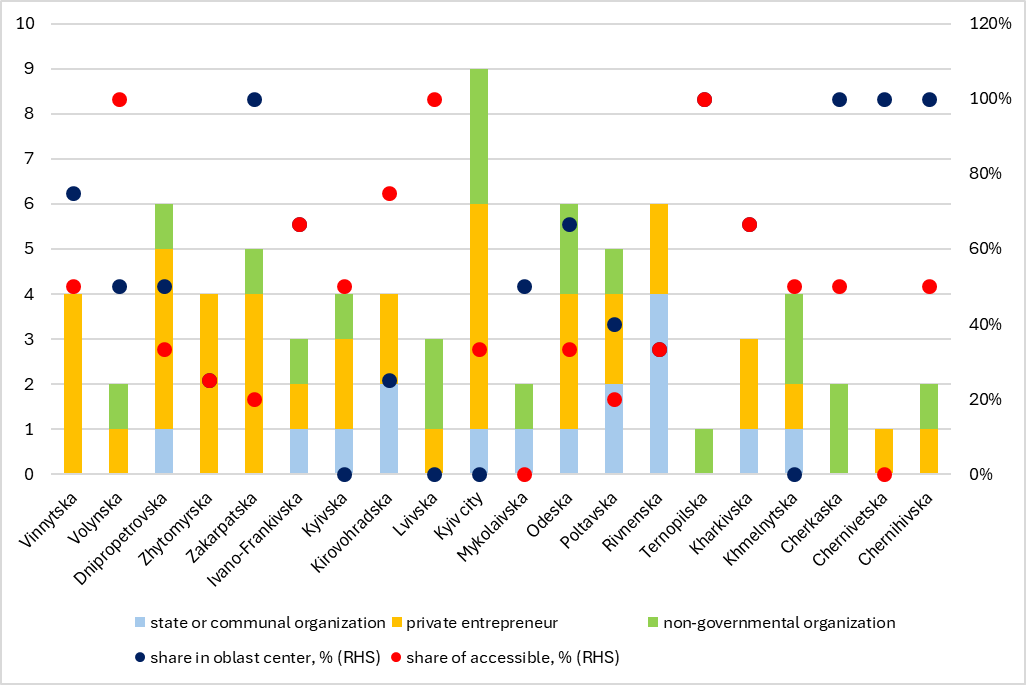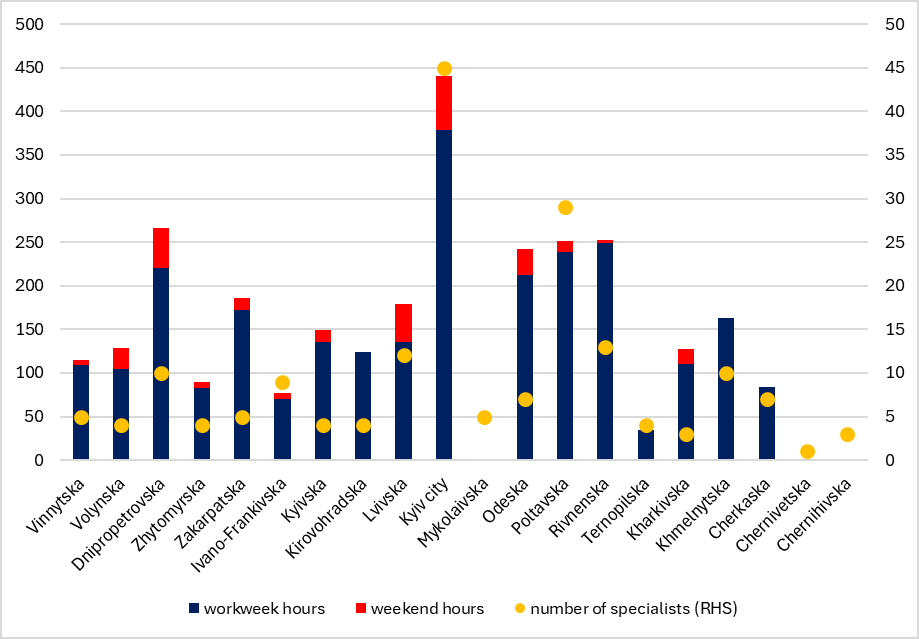The number of individuals who have obtained combatant status is increasing every day. This creates new challenges for public policy in the sphere of supporting and reintegrating war veterans into civilian life. A recent nationwide survey conducted within the framework of the “How Are You?” program found that 71% of Ukrainians feel a need for psychological support and that this need is most acute among service members. Therefore, the state must establish an effective and efficient system of psychological assistance and counseling aimed at facilitating the reintegration of war veterans.
On November 29, 2022, recognizing the importance of this aspect of rehabilitation for Ukraine’s Defenders, the government approved the Procedure for Providing Multilevel Free Psychological Assistance to Defenders and Their Families, developed by the Ministry of Veterans Affairs of Ukraine. The document was prepared with consideration of international experience and the recommendations of the World Health Organization. The Procedure defines the following:
“Psychological assistance is an activity carried out at three levels […] aimed at providing professional support to individuals at risk of developing mental or behavioral disorders; facilitating their psychosocial adaptation to changed life circumstances; helping them make sense of their experience; expanding self-awareness and opportunities for self-realization; and offering assistance in overcoming psychological challenges caused by difficult life situations, crisis conditions, emergencies or disasters, and wartime experiences.
Psychological rehabilitation is an activity aimed at restoring and maintaining an individual’s functioning in the physical, emotional, intellectual, social, and spiritual spheres through the use of psychological and psychotherapeutic methods in the form of psychotherapy, psychological counseling, or primary psychological assistance”.
The main objective of psychological assistance and rehabilitation is to preserve and restore the mental health of those seeking help, as well as to prevent the development of mental and behavioral disorders. Particular attention is given to overcoming the effects of post-traumatic stress disorder. The Procedure above outlines the key elements of psychosocial support and rehabilitation at every stage (from initial psychological assistance to psychotherapy and group work) aimed at fostering self-awareness, self-development, and the ability to communicate and interact effectively within society.
Psychological assistance is provided at three levels, each with its own specific features and objectives.
The first level encompasses social and psychological support, as well as the provision of social services, including ongoing guidance and counseling. These services are delivered by mental health units integrated into the primary healthcare system. Individuals who are not specialists in this field but have undergone appropriate training may also be involved in providing such services. This approach helps reach a broader segment of the population in need of basic psychological support, reduces the persistent stigma associated with seeking help, and ultimately enables addressing psychological difficulties at an early stage.
At the second level, assistance focuses on resolving psychological issues that have arisen, including those caused by psychological trauma in extreme, crisis, or emergency. Psychological support at this level is provided to individuals whose condition does not meet the diagnostic criteria for mental or behavioral disorders but who are at increased risk of developing them.
At the third level, psychological assistance is aimed at restoring or compensating for impaired mental functions resulting from traumatic experiences or difficult life circumstances. The primary objective of this assistance is to create conditions that enable individuals to fully recover from a psychological crisis and restore their mental and social mechanisms of adaptation to new circumstances. Providers of medical and psychological assistance at this level may include individual entrepreneurs (FOPs) licensed for medical practice, as well as legal entities holding the necessary licenses and specialized departments or units.
Together, these instruments are designed to ensure not only short-term support but also lasting positive outcomes that contribute to the sustainable recovery of the emotional well-being of veterans and their families. An important indicator of the program’s success is the development of self-help and mutual support skills among its participants, which will enable them to better integrate into civilian life. In the long term, the program’s results will extend beyond the personal emotional well-being of participants, fostering social stability within communities and society as a whole.
To access the program, individuals may independently seek psychological assistance at any of the three levels described above. A referral from a primary care or family doctor may also serve as the basis for receiving services at the second or third levels of care.
The Ministry of Veterans Affairs’ website provides a list of entities offering psychological assistance to veterans. An analysis of this list (Charts 1 and 2) reveals a concerning trend: in some regions, such assistance centers are absent (partly due to the prevailing security situation).
Chart 1. Distribution of psychological assistance centers by form of ownership (FOP, state, municipal, or other organization), location (regional center or other locality), and accessibility (inclusivity)

Source: Ministry of Veterans Affairs (note: information is missing for a small number of entities)
Chart 2. Resources of psychological assistance centers—total working hours and number of specialists

Source: Ministry of Veterans Affairs (note: information is missing for a small number of entities)
Additionally, psychological assistance can be obtained through the government’s online platform MARTA. The platform provides evidence-based tools for the psychological adaptation and rehabilitation of Defenders (both men and women) and their family members. These tools are regularly used and validated by NATO military personnel and the World Health Organization. During its first year of operation, nearly 100,000 people utilized the platform.
The main advantage of MARTA is the ability to undergo testing remotely and anonymously while receiving immediate recommendations. After completing a brief questionnaire, if the results indicate a deviation from the norm, the individual is offered additional assessments and provided with informational materials to help better understand their condition, along with practical advice on how to manage it. In addition to the personalized questionnaire, users can take diagnostic tests in eleven categories:
- Post-traumatic stress;
- Stress resilience;
- Grief response;
- Loneliness;
- General well-being;
- Anxiety;
- Alcohol dependence;
- Social interaction;
- Suicidality;
- Depression;
- Sleep.
Through this diagnostic process, individuals can gain a clearer understanding of the severity of their difficulties in each category. If the results indicate a critical condition in any area, the system advises contacting the Ukrainian Veterans Foundation’s Crisis Support Hotline and provides a list of second-level specialists who can offer professional assistance.
This resource is intended to serve as a practical toolkit for specialists in psychological support, offering them a reliable aid in their work with veterans and their families.
By combining evidence-based methods, anonymity, and accessibility, the platform enables the reach of a broad audience and the identification of psychological issues promptly, thereby helping to maintain the long-term psychological well-being of the project’s target group.
These initiatives are valuable; however, several challenges still hinder the provision of psychological assistance in the most effective manner. Foremost among them is the lack of trust among some veterans and their family members toward state institutions — stemming from those institutions’ long-standing indifference to the population’s needs. It should be noted that most providers of psychological assistance (Chart 1) are non-governmental, including civic and charitable organizations, as well as individual practitioners (FOPs).
The social stigma surrounding mental health also remains strong, leading many people to avoid testing or counseling even when they recognize their need for help.
However, the most pressing challenge is the unequal access to psychological assistance. Unfortunately, residents of frontline and remote regions often lack access to psychological assistance centers, though they are among those who need such support the most. At the same time, more than 80% of the centers listed by the Ministry of Veterans Affairs offer services online, which makes it all the more important to raise public awareness in regions that are insufficiently covered by such centers about the availability of these remote options.
Photo: depositphotos.com/ua
Attention
The author doesn`t work for, consult to, own shares in or receive funding from any company or organization that would benefit from this article, and have no relevant affiliations



